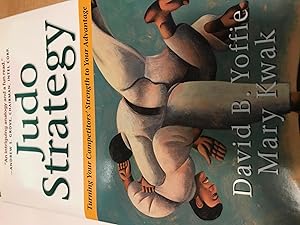A century-old strategy holds the secret to toppling corporate giants. 'In a world where advantage increasingly depends upon movement rather than position, "Judo Strategy" drills home the ultimate principle of strategy: maximize impact while minimizing effort. This is easy to say but difficult to accomplish. The authors provide pragmatic techniques and examples to help make this principle come alive. Don't enter the market without this book' - John Hagel, Author, "Net Gain and Net Worth", and Chief Strategy Officer, 12 Entrepreneuring, Inc. Why do some companies succeed in defeating stronger rivals, while others fail? This is a question that, sooner or later, all ambitious competitors must face.Whether you're a tiny start-up taking on industry giants or a giant moving into markets dominated by powerful incumbents, the basic problem remains the same: How do you compete with opponents who have size, strength, and history on their side? The answer lies in a simple but powerful lesson: Rather than oppose strength to strength, successful challengers use their opponents' size and power to bring them down. This is the message at the heart of "Judo Strategy". Based on extensive research by Harvard Business School professor David Yoffie and research associate Mary Kwak, "Judo Strategy" introduces a groundbreaking approach to competition that shows companies how to win against imposing odds. Using vivid examples from companies ranging from Wal-Mart and Charles Schwab to Juniper Networks and Palm Computing, the authors demonstrate how managers can translate the core principles of judo - a martial art that prizes skill not size - into a winning business strategy.By mastering movement, managers learn to seize the lead and make the most of their initial advantage. By maintaining balance, they can successfully engage with opponents and respond to rivals' attacks. And finally, by exploiting leverage, managers can transform their competitors' strengths into strategic liabilities. This book will help any company - large or small, new or old, virtual or physical - become a more effective competitor. In addition to developing the concept of judo strategy, it presents a defensive primer - in the form of "sumo strategy" - for companies facing judo attacks.Packed with the insights of world-class managers and strategists, "Judo Strategy" does double duty: it can help you become a giant-killer, while also teaching you to protect your hard-fought position from challengers in the wings.
David B. Yoffie is the Max and Doris Starr Professor of International Business Administration at Harvard Business School and Mary Kwak is a Research Associate at Harvard Business School.

